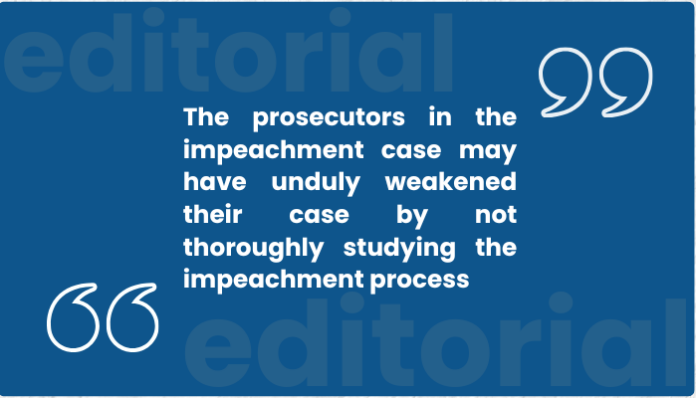MAYBE those who already smell blood with the preliminary steps in the Senate impeachment trial of Vice President Sara Duterte in June ought to brush up on what the Constitution and Senate rules say on the matter.
The quadcomm hearings may have unearthed a roomful of documentary evidence on alleged misuse of confidential funds by the Office of the Vice President and the Department of Education, but the lawmakers and now prosecutors in the impeachment case may have unduly weakened their case by not thoroughly studying the impeachment process.
That’s what can be gathered from the recent statement of election lawyer Romulo Macalintal, who doubts if the impeachment case against the Vice President would prosper, warning that time, not political maneuvering, may be the biggest obstacle.
“If the impeachment case against Sara Duterte starts being heard on June 2, that case is already dead,” Macalintal pointed out, adding that this is a clear case of too little, too late: “The present Senate no longer has time—its term ends by June 30.”
The election lawyer cited Rule 44 of the Senate, which states that all pending matters and proceedings die with the adjournment or termination of Congress. This means the incoming Senate, which convenes after June 30, cannot simply resume the impeachment trial.
If the new Senate revives it, according to Macalintal, it would be considered as if it were presented for the first time.”
The problem is that the Constitution explicitly prohibits the filing of more than one impeachment case against the same official within a one-year period.
“If there’s a new impeachment case, it would fall under what’s called the prohibition in our Constitution—you cannot have two impeachment cases within one year,” Macalintal said, suggesting that any renewed attempt would likely be blocked as unconstitutional.
On the other side of the bar, retired Supreme Court Associate Justice Adolfo Azcuna said the impeachment process must start during the 19th Congress – which ends on June 30 – or it could raise issues of jurisdiction if it extends into the 20th Congress.
He underlined the trial proper can wait but the impeachment court has to be convened to allow the body to acquire jurisdiction over the complaint.
Senate President Francis Escudero himself said the trial may possibly begin after the third State of the Nation Address of President Marcos Jr. in July.
Will procedural matters trump the substantive findings of the House In other words, did the lengthy quadcomm hearings simply go to waste because the House lawmakers completely missed what the Constitution and Senate rules are saying?
Other legal luminaries would probably have a different reading of the rules and insist that the impeachment trial should go on as scheduled.
The House prosecution panel, of late beefed up with the addition of former Senator and Justice Secretary Leila de Lima and Founding Dean of the De La Salle University College of Law Chel Diokno, would probably disagree with Macalintal’s view.
But we’ll have to wait for what they—and their nine other colleagues in the prosecution team— have to say regarding this issue.








